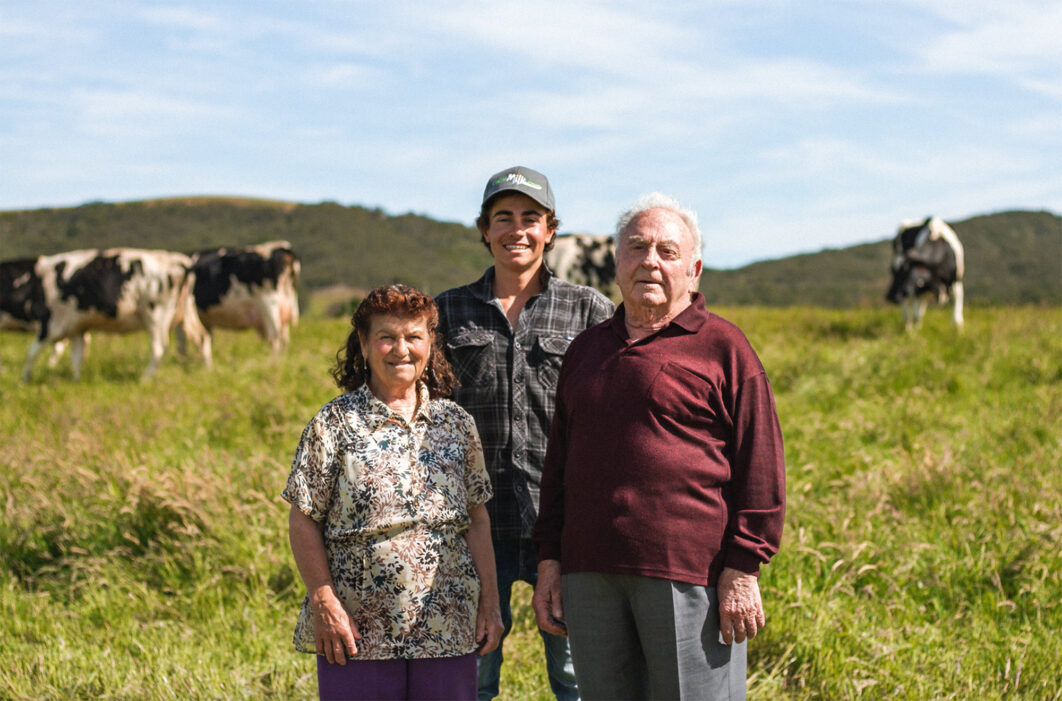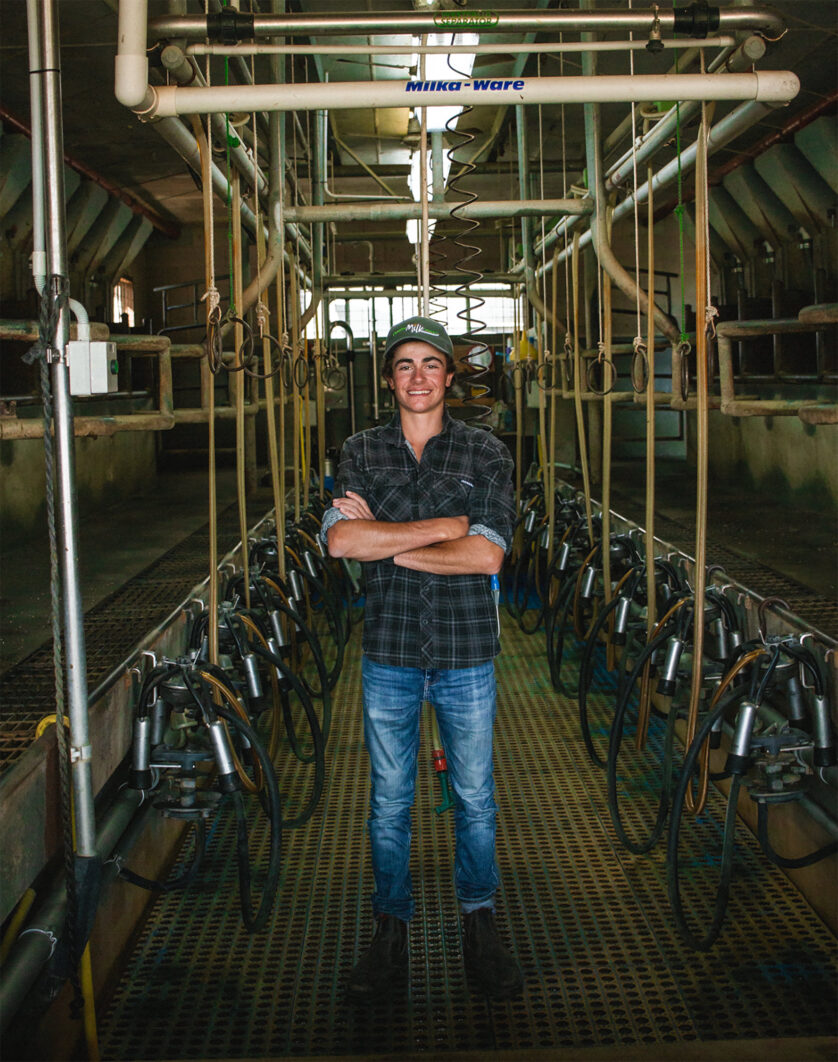Nick Mignanelli’s vision for his family dairy was simple: happy, healthy cows and a clean and tidy dairy. Following international travel, the 22-year-old Hindmarsh Tiers farmer now has bigger plans, including the installation of cell count meters in the dairy, and digital ear tags for cows.
Nick is a third-generation farmer, working alongside his dad Eddy and grandparents Carmine and Lydia, who developed the 527 acre property, Verde Valley, in 1960 after moving to Australia from Italy.

Nick has been working on the farm since he was a kid, and his thirst for knowledge has seen him travel to New Zealand and Ireland to learn about different dairy systems. In January, he will travel to America to see large scale dairy enterprises.
The travel was possible due to a BBM Global Footprints Scholarship, which Nick won in 2022.
“I had to write an application that was 4,500 words about what I do here and what I want to do and that was pretty daunting. But they must have picked up that I’m a little bit passionate, so I got it,” Nick said.
“I went to New Zealand for 10 days and did five days on-farms and five days of traveling around the North Island. It was amazing.”
Nick’s trip to Europe enabled a visit to extended family in Italy as well as farm visits in Ireland to learn about silage and pasture systems.
Nick is bringing all of this knowledge back to Verde Valley, where he plans to keep improving the herringbone dairy.
Two years ago, the family invested in an Alfa Laval 6000 litre vat which has boosted onsite milk storage capability considerably, and this year the dairy is being extended from an 8-aside to a 10-aside.
They are currently milking 150 cows, with another 30 dry cows taking the total herd to 180.
“We’re not the biggest and I’m not aiming to be,” Nick said. “I want to be good at what I do. I want a clean and tidy dairy, I want fences and gates that work, I want healthy, happy cows.
“But I also want a few things that make life easier. With the new milk vat, you just press a button and it washes itself, which is pretty cool compared with scrubbing it with the brush.
“Little things like that can make a huge difference. It’s a more consistent clean and it’s labour saving. We used to need someone to clean the vats, and now it’s automated. That person can now spend time improving the dairy.”
The addition of the two extra milking spaces will also be significant for labour savings and cow health. Verde Valley currently has a team of four casual and one full time milkers plus family, and Nick said with employees getting harder to find, the dairy processes need to be as efficient as possible.
“The extension will save us half an hour in milking time, which means savings in labour, plus benefits for animal health due to the reduction in milking waiting times for the cows,” Nick said.
“And it will make life easier for our milking team who are fantastic. I couldn’t do any of this without them.”
If there is money left over after the extension, Nick wants to invest in CowManager digital ear tags which measure temperature. This information, combined with eating and visual cues, results in more accurate and earlier alerts of heat. “This tool will help me to better manage cows due to 24/7 monitoring, which will allow me to do all the other farm jobs with less stress,” he said.
Nick is also applying for a $250,000 grant to install yield, butter fat, protein and cell count meters on each of the 10 milking machines, and to set up a feed to production system.
“These meters will give us immediate information about our milk quality, as we’re milking,” Nick said. “This is innovation to us – it’s about better sustaining our business. This is going to improve our production. This will enable us to make milk with better components for the future. But installing the meters is a $250,000 job and without the grant we won’t be able to do it.”
Milk quality information is currently provided regularly by Fleurieu Milk, who process Verde Valley milk.
“They test the milk every day for residues and so on, and we get information about cell counts twice a week. Our milk sits within the target range. For Fleurieu Milk, it’s got to be under 200,000 cells/ml. We’re always under 200,000. We get under 100,000 from time to time,” Nick said.
Nick’s hard work has seen the business go from a 13 litre daily average to a 30 litre average over the last five years.
“We’ve pretty well doubled production without doubling input costs, so I suppose that’s a bit magical,” he said.
Nick puts the extra litres down to ‘one percenters’ including soil testing, strategic fertiliser application, grazing and cow nutrition and understanding what each cow needs.
“The biggest thing I’ve learnt is you need to get the basics right. I’m not out to be the biggest farmer. A want a presentable, productive property and happy people and happy cows.
“It doesn’t matter if you make a few mistakes – you learn from them and have another crack.”
Learn more about Nick here.
Don Campbell Memorial Tour
Nick also completed the Don Campbell Memorial Tour to Tasmania in 2021, through DairySA.
“I’m passionate about the industry and I am super keen to learn and see other systems and to pick farmers brains about what works and what doesn’t,” he said.
Nick said it was eye opening to see the different ways that Tasmanian farmers run their operations. “Sustainability and profitably are words that can go together,” he said. “And great results are achievable without having to work the cows too hard.”
Would he recommend this tour to others? “Definitely! If you’re keen to make a career out of dairy farming and are passionate, you’ll love the tour. One tip – don’t be afraid to be the first one to walk up to someone and start the conversation, put yourself out there!”
